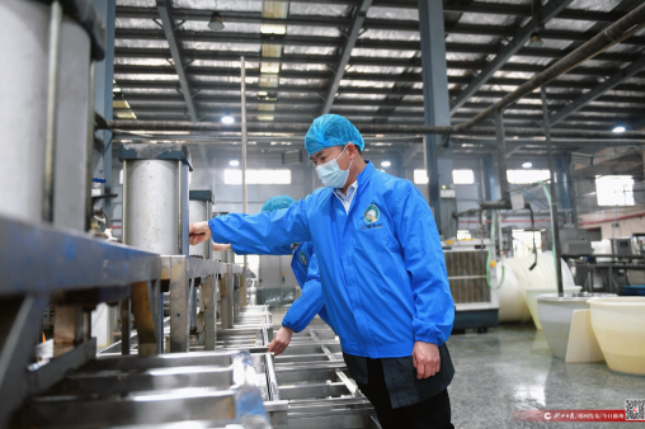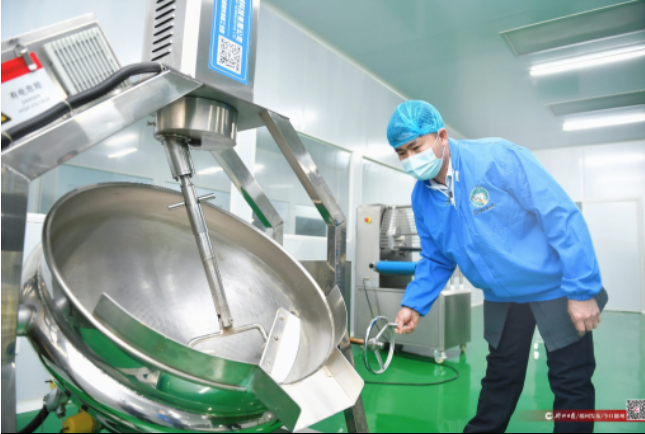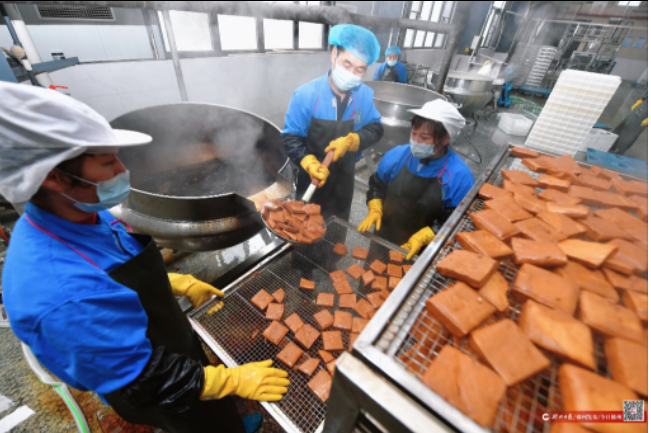Tofu inheritor turns family-run workshop to industry leader
2025-06-02
The workshop of Hunan Aihekang Food Co., Ltd. was a hive of activity, where traditional tofu making skills are perfectly integrated with modern technology.
“Now it only takes 5 minutes to press one plate of tofu,” said Wang Xiaoquan, general manager of the company, who stood next to the production line.

Wang Xiaoquan is the third generation inheritor of the “Tofu Family”. When he took over the workshop, it, with a history of nearly 100 years, still maintained its most primitive appearance.
“My parents woke up at 2 o'clock in the morning every day and had to work until dawn to make toufu from 10 kilograms of beans,” he said.
He resolutely returned to his hometown and took over this family skill in 2011, after he ran a supermarket in Dongguan City of Guangdong Province for more than 10 years.
In 2015, Wang Xiaoquan introduced the first semi-automatic production line, with temperature sensors accurately controlling the boiling temperature and pressure gauges replacing hand feel to determine the pressing force. The production of tofu has increased by about 5 times, but tofu is still in short supply.

In 2021, Chenzhou City introduced "Liangye Tofu" into the Beihu Modern Agricultural Industrial Park located in Huatang Town, Beihu District through the Vegetable Basket Project. Hunan Aihekang Food Co., Ltd. was established, with an investment of 120 million yuan and a production base covering an area of 43 acres officially put into operation.
Technology makes tofu making less difficult. The automatic pressing devices running in the workshop are developed by Wang Xiaoquan’s team. Traditional tofu is pressed with stones, springs, or levers, and workers have to carry stones weighing tens of kilograms. Now only when workers lightly press the button, with parameters set well, the air pressure device will automatically press beans, with efficiency increased by more than 10 times. The milky white tofu gradually takes shape under constant pressure within 2 minutes.
There is also a soybean residue ball production line. The rotating metal blades turn at a constant speed, and 100 kilograms of soybean residue turn golden in a constant temperature wok.
“In the past, people used to manually stir fry soybean residue in iron pots, which needs two hours per pot. Now it takes half an hour to complete one pot of soybean residue, with stable quality,” said Wang Xiaoquan.
Soybean residue can be made into soybean residue balls and biscuits, which were developed by his grandfather. After equipment improvement, soybean residue is increased to 52 yuan per kilogram as high-quality food from 0.4 yuan per kilogram as feed.

“The first national standard for making soybean residue balls was established by our company,” said Wang Xiaoquan.
In the company’s product display hall, 43 fresh varieties in four categories, such as gypsum tofu, enzyme tofu, and brine tofu, are on display.
“Northerners love solid brine tofu, while southerners prefer smooth and tender lactone tofu, both of which the company can produce,” said Wang Xiaoquan. In his hands, water tofu has been transformed into instant tofu pudding, soybean residue has been made into biscuits, and tofu water has been developed into plant-based protein drinks.

Over the past 10 years, the company has obtained 16 national patents, covering the entire process from soaking beans to packaging. The company has also won multiple honors such as “National High-tech Enterprise”, “Hunan Leading Enterprise”, “Hunan Famous Brand”, and “Hunan Time-honored Brand”. The traditional tofu making techniques have been included in the provincial-level intangible cultural heritage projects in Hunan.
At present, the company can process 30 tons of soybeans and produce 90 tons of soy products every day. The company has 15 self-operated stores and more than 200 franchise agent stores. The sales reached 118 million yuan in 2024.
In the laboratory jointly established with Hunan Agricultural University, researchers were busy testing formulas for soybean residue biscuits, bread, cakes, mooncakes, rice, and noodles. The company has also cooperated with Tsinghua University to research the reuse of tofu paste water to produce organic fertilizers.
“The company invested 50 million yuan in the second phase of the project, which is mainly used to produce soybean milk, bean sprouts, bean snacks and soybean residue products. It’s expected to start construction in June this year,” said Wang Xiaoquan.
Chinese source: Chenzhou Today




